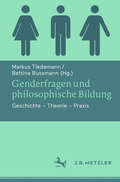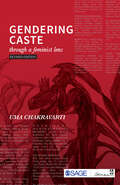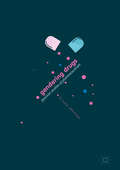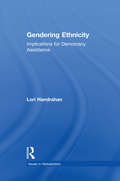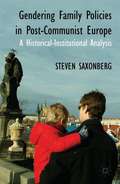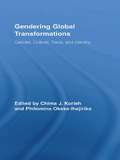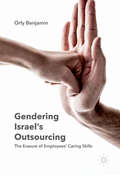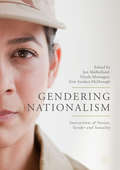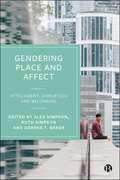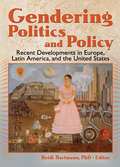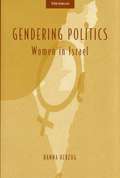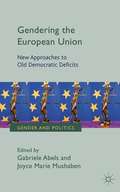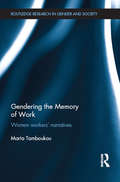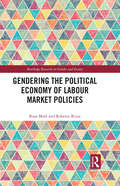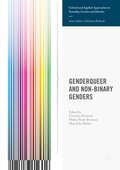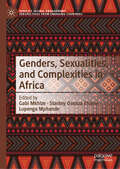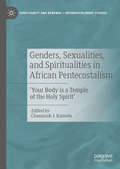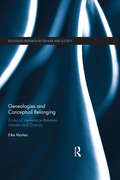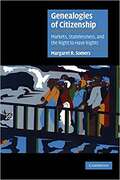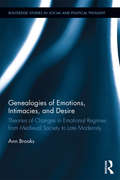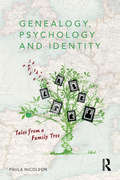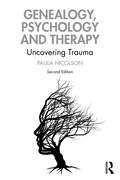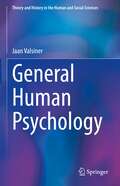- Table View
- List View
Genderfragen und philosophische Bildung: Geschichte - Theorie - Praxis
by Carolin Seyffert Anne-Marie Leiblich Juliane Köhler Sophia Beyer Mario KötterMit diesem Band wird eine Lücke in der philosophischen Fachdidaktik geschlossen. Ein historischer Teil stellt zunächst bei gleichzeitig kritischer Diskussion Autorinnen und Autoren vor, die den Geschlechterdiskurs bestimmt haben. Danach wird ein Überblick über die sexuelle und geschlechtliche Vielfalt, ihre Grundlagen und Ausdifferenzierungen gegeben. In theoretischen Abhandlungen geht es anschließend um die Relevanz der Genderforschung für das Selbstverständnis philosophischer Bildung. Praxisspezifische Beiträge demonstrieren schließlich, wie Themen und Aspekte der Genderproblematik für verschiedene Altersstufen und Schulformen aufbereitet werden können. Mit 2 Unterrichtsplanungen.
Gendering Caste: Through a Feminist Lens (Theorizing Feminism)
by Uma ChakravartiThe continuous demand for Gendering Caste: Through a Feminist Lens (2003) led to this revised edition which analyses the recent socio-economic and political changes that have taken place. Caste-based marriage and control over women′s sexuality have been crucial for the continuation of the caste system in India. Thus, caste and gender are linked. Brutal reprisals have followed when dalits and women have tried to challenge caste-based marriage and inequality which allots strict rules of conduct for women and all dalits. Maithreyi Krishnaraj, the Series Editor, highlights the author’s discussion on the new ways in which caste violence targets women and on the changes within the family—immediate and extended—that still keep women subservient to caste norms. She points to the new discussion on an economy in transition to capitalism, and persistent conflicts over religion, language, ethnicity and other differences that relate to gender. The book also includes a new ‘Afterword: Caste and Gender in the New Millennium’, which provides an updated discussion on the Scheduled Castes and Scheduled Tribes (Prevention of Atrocities) Act 1989 (known in short as Prevention of Atrocities Act: POA). Erudite, yet accessible, this book enables the reader to understand the ramifications of caste today.
Gendering Drugs: Feminist Studies of Pharmaceuticals
by Ericka JohnsonThis book, by bringing together critical pharmaceutical studies and feminist technoscience studies, explores the way drugs produce sexed and/or gendered identities for those who take – or resist – them, and how feminist technoscience studies can contribute a theoretical lens with which to observe sex and gender in the pharmaceuticalization processes. Topics explored in this diverse collection include the use of hormones to delay puberty onset for trans children; HPV vaccination against cervical cancer in Sweden, the UK, Austria and Colombia; Alzheimer’s discourses; and the medication of prostate issues. Ericka Johnson has brought together an innovative and timely collection that demonstrates gender as relevant in studies of pharmaceuticals, and provides multiple examples of methodological and theoretical tools to consider gender while studying drugs.
Gendering Ethnicity: Implications for Democracy Assistance (Issues in Globalization)
by Lori HandrahanDemocracy, anticipated by American and other Western powers to prevent economic chaos and political conflict within and among states, is not evolving as expected. This research argues that part of the failure resides in United States democracy assistance's inadequate consideration of gender within democracy programming.
Gendering Family Policies in Post-Communist Europe
by Steven SaxonbergThrough the use of a historical-institutional perspective and with particular reference to the Czech Republic, Hungary, Poland and Slovakia; this study explores the state of family policies in Post-Communist Europe. It analyzes how these policies have developed and examines their impact on gender relations for the countries mentioned.
Gendering Global Transformations: Gender, Culture, Race, and Identity (Routledge Research in Gender and Society)
by Chima J. Korieh Philomina E. Okeke-IhejirikaThe authors collected in Gendering Global Transformations: Gender, Culture, Race, and Identity probe the effects of global and local forces in reshaping notions of gender, race, class, identity, human rights, and community across Africa and its Diaspora. The essays in this unique collection employ diverse interdisciplinary approaches--drawing from subjects such as history, sociology, religion, anthropology, gender studies, feminist studies--in an effort to centralize gender as a category of analysis in developing critical perspectives in a globalizing world. From this approach come a host of exciting insights and subtle analyses that serve to illuminate the effects of issues such as international migration, globalization, and cultural continuities among diaspora communities on the articulation of women’s agency, community organization, and identity formation at the local and the global level. Bringing together the voices of scholars from Africa, Europe and the United States, Gendering Global Transformations: Gender, Culture, Race, and Identity, offers a multi-national and wholly original perspective on the intricacies of life in a globalized era.
Gendering Israel's Outsourcing
by Orly BenjaminThis book presents an institutional ethnography of budgeting processes of commissioning contracts within welfare, education, and health ministries as case studies. With the historical surge in the power position of economic globalization organizations and their impact on public sectors' withdrawal from the role of primary women's employers, a gap between care worker employees and public sector administrators with respect to skill recognition has emerged in Israel. The book examines precisely how this gap is produced, enacted, and turned into a force that shapes the experiences of women in service and caring jobs. Increasingly more researchers are interested in the unexpected consequences of outsourcing; this account enters the Israel studies researchers' debate over the extent to which the neo-liberalization of Israel had restructured its welfare orientation. Exposing the operation of service delivery in the gendering of women's work may thus be intriguing for those participating in this debate. The analysis of the data presented here enables a portrayal of the negotiating and budgeting processes at work, which in turn sheds light on the salience of deskilling and de-professionalization to women's disenfranchisement.
Gendering Israel's Outsourcing: The Erasure of Employees' Caring Skills
by Orly BenjaminThis book presents an institutional ethnography of budgeting processes of commissioning contracts within welfare, education, and health ministries as case studies. With the historical surge in the power position of economic globalization organizations and their impact on public sectors’ withdrawal from the role of primary women’s employers, a gap between care worker employees and public sector administrators with respect to skill recognition has emerged in Israel. The book examines precisely how this gap is produced, enacted, and turned into a force that shapes the experiences of women in service and caring jobs. Increasingly more researchers are interested in the unexpected consequences of outsourcing; this account enters the Israel studies researchers’ debate over the extent to which the neo-liberalization of Israel had restructured its welfare orientation. Exposing the operation of service delivery in the gendering of women’s work may thus be intriguing for those participating in this debate. The analysis of the data presented here enables a portrayal of the negotiating and budgeting processes at work, which in turn sheds light on the salience of deskilling and de-professionalization to women’s disenfranchisement.
Gendering Nationalism: Intersections Of Nation, Gender And Sexuality
by Nicola Montagna Jon Mulholland Erin Sanders-McDonaghThis volume offers an empirically rich, theoretically informed study of the shifting intersections of nation/alism, gender and sexuality. Challenging a scholarly legacy that has overly focused on the masculinist character of nationalism, it pays particular attention to the people and issues less commonly considered in the context of nationalist projects, namely women and sexual minorities. Bringing together both established and emerging researchers from across the globe, this multidisciplinary and comparison-rich volume provides a multi-sited exploration of the shifting contours of belonging and Otherness generated by multifarious nationalisms. The diverse, and context specific positionings of men and women, masculinities and femininities, and hegemonic and non-normative sexualities, vis-à-vis nation/alism, are illuminated through a vibrant array of contemporary theoretical lenses. These include historical and feminist institutionalism, post-colonial theory, critical race approaches, transnational and migration theory and semiotics.
Gendering Place and Affect: Attachment, Disruption and Belonging
by Nick Rumens Rachel Morgan Katherine Johnson Melissa Tyler Patricia Lewis Christina Schwabenland Murray Lee Anna Hickey-Moody Nicholas Hill Daniel Harris Evgenniia Kuziner Nyk Robertson Troy Innocent Jessica Horne Paul McGuinness Alison Hirst Corina Sheerin Rajeshwari Chennangodu George KandathilDrawing on affect theory and the key themes of attachment, disruption and belonging, this book examines the ways in which our placed surroundings – whether urban design, border management or organisations – shape and form experiences of gender.Bringing together key debates across the fields of sociology, geography and organisation studies, the book sets out new theoretical ground to examine and consolidate shared experiences of what it means to be in or out of place.Contributors explore how our gendered selves encounter place, and critically examine the way in which experiences of gender shape meanings and attachments, as well as how place produces gendered modes of identity, inclusion and belonging. Emphasizing the intertwined dynamics of affect and being affected, the book examines the gendering of place and the placing of gender.
Gendering Politics and Policy: Recent Developments in Europe, Latin America, and the United States
by Heidi I. HartmannTop feminist theorists and scholars examine the latest developments in gender politics and policy around the worldGendering Politics and Policy: Recent Developments in Europe, Latin America, and the United States discusses in depth how women and women&’s perspectives are changing politics and policy in both the United States and around the world. This compelling resource surveys a range of issues and methodologies to bring the most recent gender issues, politics, and policies into clear focus. Top feminist scholars and theorists from several disciplines explore the latest in gender mainstreaming, gender budgeting, citizenship, social capital, and the gender gap in various cultures and countries.Gendering Politics and Policy provides case studies of different policy areas, techniques, and political practice as it highlights issues important for women and women&’s issues around the world. The book&’s three main sections include detailed looks at politics and gender issues in the United States, policies of concern for women in Latin America and Europe, and women&’s agendas in the United Nations. This book is extremely useful as a teaching tool for students by surveying a wide range of vital issues and methodologies of gender development, women and politics, women and public policy, and women in international politics. The text is extensively referenced and includes several tables and figures to clearly present data and ideas.Gendering Politics and Policy discusses: the need for women&’s citizenship-a new form of gendered citizenship more inclusive of women&’s issues that strengthens democratic governability gender politics in presidential elections-including the impact the attention to women&’s votes has had on public policies of administrations between elections the relationships between women&’s status and social capital attack campaigning of male candidates against women candidates the gender implications of economic policy in the United Kingdom the discretionary nature of funding for support of domestic violence laws in Latin America, Central America, and the Caribbean region women&’s increased leadership roles in German government the need for gender mainstreaming in the German economy child care as an international human right the involvement of women&’s nongovernmental organizations at UN conferencesGendering Politics and Policy is illuminating reading for educators, advanced undergraduate and graduate students in women&’s studies, political science, and public policy, as well as policy researchers and women leaders around the world.
Gendering Politics: Women in Israel
by Hanna HerzogWhat are the cultural and structural mechanisms that exclude women from politics in general and from local politics in particular? What meaning is ascribed to women's political activity? Gendering Politics explores the place of women in democratic politics by means of a detailed study of women in Israeli politics who were elected to municipal councils from 1950 to 1989. Drawing from a variety of sources, including questionnaires, interviews, newspaper coverage, and existing statistical data, as well as examinations of studies of the role of women in politics in other democracies, Herzog analyzes the extent of success and failure of women in Israeli elections. She then explores reasons why female participation in Israeli politics has been relatively slight, despite historical precedents and social circumstances that would indicate otherwise. The author examines the gendered bias of the power structure as it is shaped by basic cultural organizing principles. She exposes hidden assumptions--and notes the overt assumptions--which by definition exclude women from politics. The author also looks at the structure of opportunities within the prevailing political system, uncovering the relevant blocking and facilitating elements.
Gendering the European Union
by Gabriele Abels Joyce Marie MushabenAn exploration of European integration as seen through a gender lens. This book looks at integration theories, institutional relationships, enlargement, the development of gender law and the role of formal actors, scholars and expert networks in the EU policy-making process. With a focus on gender mainstreaming as a new approach to gender policy.
Gendering the Memory of Work: Women Workers’ Narratives (Routledge Research in Gender and Society)
by Maria TamboukouThis book explores gendered aspects in the memory of work by looking at auto/biographical narratives and political writings of women workers in the garment industry. The author draws on cutting edge theoretical approaches and insights in memory studies, neo-materialism and discourse analysis, particularly looking at entanglements and intra-actions between places, bodies and objects. Tamboukou aims to enrich our appreciation of the role of women’s labour history in the wider realm of cultural memory, as well as in the politics of women’s work. The book addresses a significant gap in the literature by focusing on the memory of work from a gendered perspective. It also examines the relationship between workspaces and personal spaces: the intimate, intense and often invisible ways through which workers occupy workspaces and populate them with their ideas, emotions, beliefs, habits and everyday practices. The book will be a theoretical and methodological toolbox for students and researchers in the interface of the social sciences and the humanities, as well as a vital resource in women’s labour history. It will be particularly relevant for sociologists, cultural theorists, feminist scholars and social historians.
Gendering the Political Economy of Labour Market Policies (Routledge Research in Gender and Society)
by Rosa Mulè Roberto RizzaThis book is a re-interpretation of labour market policy models from a gender perspective, providing an analysis of within-gender inequality and how these policies affect inequality. It sheds light on the internal and external challenges confronting different gendered political economies, with distinct constellations of adjustment problems and reform agendas to incorporate women into the labour market. As such, the book shows how female political mobilization can influence labour market policy-making process. The target audience of this book is made by researchers and postgraduate students in the disciplines of sociology, gender studies, political science, political economy, and practitioners working in the fields of welfare policies and gender labour market services.
Genderqueer and Non-Binary Genders
by Christina Richards Meg-John Barker Walter Pierre BoumanThis book addresses the emerging field of genderqueer or non-binary genders - that is, individuals who do not identify as male or female. It considers theoretical, research, practice, and activist perspectives; and outlines a basis for good practice when working with non-binary individuals. The first section provides an overview of historical, legal and academic aspects of this phenomenon. The second section explores how psychotherapeutic, psychological and psychiatric theory and practice are adapting to a non-binary model of gender, and the third section considers the body related aspects, from endocrinology to surgery. This work will appeal to a wide readership, from practitioners working with non-binary individuals - including psychologists, surgeons, social workers, nurses, psychiatrists, endocrinologists, psychotherapists and counselors, lawyers, and healthcare workers - to researchers interested in the study of gender identities, to students and gender activists.
Genders, Sexualities, and Complexities in Africa (Africa's Global Engagement: Perspectives from Emerging Countries)
by Stanley Osezua Ehiane Gabi Mkhize Lupenga MphandeThis book’s significance is in its African-centred border crossing overt and covert forces working against genders and sexualities, reinforcing endemic gender and sexual based complexities. Pragmatically, sexualities and genders in Africa remain contested and an area of power and control contestations in both the private and public spheres. Gender based violence and femicide (GBVF), in particular, continue to escalate, particularly during the COVID-19 pandemic. Such GBVF, at most, affects young women, migrants, LGBTIQIA+ people, sex workers, informal street traders, and widows, amongst others. This is happening at a time when the feminist and women’s movements in Africa are experiencing fragmentations and factions that pull and push organising to the margins of prejudice internally, thereby exacerbating an act of ‘subordinated inclusion’. In this context, the term ‘subordinated inclusion’ connotes another form of complexity where the ‘subaltern’ has been brought inside a room as an act of inclusion yet systemically subordinated through structure and obedience, thereby compromising agency. This complexity occurs in private and public domains, where a continuum of contestations between structure and agency is sustained. Consequently, power struggles emerge and proliferate unabated into gendered and sexualised complexities, including relations of state, coloniality, apartheid, prejudice, marginalization, capitalism and democracy. This book thus strives to surface these contestations and complexities and how they continue to thrive in an era that seeks another way possible, a way out, a jump off, a manner of dealing and an exit from the status quo.
Genders, Sexualities, and Spiritualities in African Pentecostalism: 'Your Body is a Temple of the Holy Spirit' (Christianity and Renewal - Interdisciplinary Studies)
by Chammah J. KaundaThis book examines the complex and multifaceted nature of African Pentecostal engagements with genders and sexualities. In the last three decades, African Pentecostalism has emerged as one the most visible and profound aspects of religious change on the continent, and is a social force that straddles cultural, economic, and political spheres. Its conventional and selective literal interpretations of the Bible with respect to gender and sexualities are increasingly perceived as exhibiting a strong influence on many aspects of social and public institutions and their moral orientations. This collection features articles which examine sexualities and genders in African Pentecostalism using interdisciplinary methodological and theoretical approaches grounded within traditional African thought systems, with the goal of enabling a broader understanding of Pentecostalism and sexualities in Africa.
Genealogies and Conceptual Belonging: Zones of Interference between Gender and Diversity (Routledge Research in Gender and Society)
by Eike MartenTaking recent German debates of diversity terminology as a case example for scrutinizing enactments of genealogy that assume a linear image of progressive generation, this book engages with performative effects of genealogical stories in academic texts that negotiate conceptual belonging. While supporters of the developing Diversity Studies in Germany cherish diversity’s potential for multi-category investigations, Gender and Women’s Studies critics reject the term for its neoliberal, managerial rationale, allegedly holding profit above social justice. Genealogies and Conceptual Belonging intervenes in this oppositional debate by turning one’s attention to narrations of the origins of "gender" and "diversity" that suggest their proper place in the present. Presenting a story about dis/continuous genealogies and highlighting complicated interferences between gender and diversity, Marten forges novel future connections between questions of gender, sexual difference, and diversity. This pioneering volume will be of particular interest to undergraduates, postgraduates and postdoctoral researchers interested in the fields of genealogy, Gender Studies, feminist theory, feminist science studies and critical race / diversity / intersectionality studies.
Genealogies of Citizenship: Markets, Statelessness, and the Right to Have Rights (Cambridge Cultural Social Studies)
by Margaret R. SomersGenealogies of Citizenship is a remarkable rethinking of human rights and social justice. As global governance is increasingly driven by market fundamentalism, growing numbers of citizens have become socially excluded and internally stateless. <p><p> Against this movement to organize society exclusively by market principles, Margaret Somers argues that socially inclusive democratic rights must be counter-balanced by the powers of a social state, a robust public sphere and a relationally-sturdy civil society. Through epistemologies of history and naturalism, contested narratives of social capital, and Hurricane Katrina's racial apartheid, she warns that the growing authority of the market is distorting the non-contractualism of citizenship; rights, inclusion and moral worth are increasingly dependent on contractual market value. <p><p> In this pathbreaking work, Somers advances an innovative view of rights as public goods rooted in an alliance of public power, political membership, and social practices of equal moral recognition - the right to have rights.
Genealogies of Emotions, Intimacies, and Desire: Theories of Changes in Emotional Regimes from Medieval Society to Late Modernity (Routledge Studies in Social and Political Thought)
by Ann BrooksGenealogies of Emotions, Intimacies and Desire excavates epistemologies which attempt to explain changes in emotional regimes from medieval society to late modernity. Key in this debate is the concept of intimacy. The book shows that different historical periods are characterized by emotional regimes where intimacy in the form of desire, sex, passion, and sex largely exist outside marriage, and that marriage and traditional normative values and structures are fundamentally incompatible with the expression of intimacy in the history of emotional regimes. The book draws on the work of a number of theorists who assess change in emotional regimes by drawing on intimacy including Michel Foucault, Eva Illouz, Lauren Berlant, Anthony Giddens, Laura Ann Stoler, Anne McClintock, Niklas Luhmann and David Shumway. Some of the areas covered by the book include: Foucault, sex and sexuality; romantic and courtly love; intimacy in late modernity; Imperial power, gender and intimacy, intimacy and feminist interventions; and the commercialization of intimacy. This book will appeal to students and scholars in the social sciences and humanities, including sociology, gender studies, cultural studies, and literary studies.
Genealogy, Psychology and Identity: Tales from a family tree
by Paula NicolsonThe popularity of amateur genealogy and family history has soared in recent times. Genealogy, Psychology and Identity explores this popular international pastime and offers reasons why it informs our sense of who we are, and our place in both contemporary culture and historical context. We will never know any of the people we discover from our histories in person, but for several reasons we recognize that their lives shaped ours. Paula Nicolson draws on her experiences tracing her own family history to show how people can connect with archival material, using documents and texts to expand their knowledge and understanding of the psychosocial experiences of their ancestors. Key approaches to identity and relationships lend clues to our own lives but also to what psychosocial factors run across generations. Attachment and abandonment, trusting, being let down, becoming independent, migration, health and money, all resonate with the psychological experiences that define the outlooks, personalities and the ways that those who came before us related to others. Nicolson highlights the importance of genealogy in the development of identity and the therapeutic potential of family history in cultivating well-being that will be of interest to those researching their own family tree, genealogists and counsellors, as well as students and researchers in social psychology and social history.
Genealogy, Psychology and Therapy: Uncovering Trauma
by Paula NicolsonFully revised and updated, Genealogy, Psychology and Therapy highlights the importance of genealogy in the development of identity, and the therapeutic potential of family history in cultivating wellbeing. The popularity of amateur genealogy and family history has soared in recent times. We will never know any of the people we discover from our histories in person, but for several reasons, we recognize that their lives shaped ours. Key approaches to identity and relationships lend clues to our own lives but also to what psychosocial factors run across generations. Attachment and abandonment, trusting, being let down, becoming independent, migration, health and money, all resonate with the psychological experiences that define the outlooks, personalities and the ways that those who came before us related to others. This new edition builds on the original book, Genealogy, Psychology, and Identity, by highlighting the work of Erik Erikson along with studies of the quality of attachment, historical social conditions especially war, forced migration, health inequalities and financial uncertainty, to enable a more detailed understanding of trauma and its long shadow, and to focus on how genealogy informs our identities and emotional health status, exploring the transmission of trauma across generations. The intergenerational transmission of trauma is examined using analysis of real-life family examples, alongside an assessment of a narrative therapy approach to healing. The book expands on how psychological practices together with genealogical evidence may impart resilience and emotional repair, and develops the discussion of the psychological methods by which we interconnect in a reflective way with material from archival databases, family stories and photographs and other sources including DNA. Showing how people can connect with archival material, using documents and texts to expand their knowledge and understanding of the psychosocial experiences of their ancestors, this book will be of interest to those researching their own family tree, genealogists and counsellors, as well as students and researchers in social psychology and social history.
General Human Psychology (Theory and History in the Human and Social Sciences)
by Jaan ValsinerThe book includes a new theoretical synthesis of William Stern’s classic personology published in the 1930s with contemporary cultural psychology of semiotic mediation developed by the author over the last two decades. It looks at the human mind as it operates in its full complexity, starting from the most complex general levels of aesthetic and political participation in society and ending with individual willful actions in everyday life contexts.
General Principles of Sociology-1
by P. Jaganathan Usha Jaganathan J. P. ArjunSociology, the scientific examination of societal dynamics, encompasses social relationships, interactions, and cultural phenomena. Evolving beyond its traditional scope, it now delves into areas such as health, economics, education, and military and penal systems. Its expansion aids policymakers, educators, legislators, and administrators in addressing social challenges. Sociology's interdisciplinary approach has made it indispensable for understanding and resolving contemporary societal issues, emphasizing its crucial role in shaping policies and fostering social progress.
